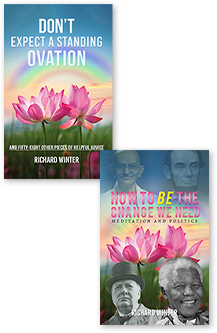
'Don't Expect a Standing Ovation and fifty-eight other pieces of helpful advice meditation as a Form of Self-Help'
How shall I lead my life? What will bring me happiness (and can I possibly know this in advance)/? Where do my ethical values, feelings and opinions come from? How do I know if I really understand anything; or are my judgements always just opinions? Should I be optimistic or pessimistic about ‘human nature’ – including my own, of course? Finally: are there any ‘objective’ answers to all of this or is any answer always as good as any other? If such questions seem important to you personally, then this book is written for you. Its focus is precisely on methods for understanding better the nature of our experience, behaving more ethically and with greater emotional awareness.‘Don’t Expect a Standing Ovation’ is a reworking in contemporary terms of ancient Buddhist teaching on meditation, but it is intended for readers of any ‘faith’ (or none), i.e. for anyone who is looking for a practical response to the sense of unease arising from the questions listed above. Buddhist teachings are therefore introduced, not as part of a ‘religion’, but as a combination of psychological and ethical ideas that are in themselves quite familiar. The teaching consists of a set of fifty-nine slogans or maxims (of which no. 59 is the title of the book), which taken together form a practical handbook of guidance in responding skilfully (and indeed, therefore, ‘wisely’) in our everyday interactions with others. The use of the slogans presents meditation as a method of self-education or self-therapy, which can also readily be adapted for use on a group-support basis. It is thus very different from books on meditation methods intended to introduce readers to Buddhism and from accounts of ‘mindfulness’ widely used in quasi-medical professional settings.
Post Views : 582